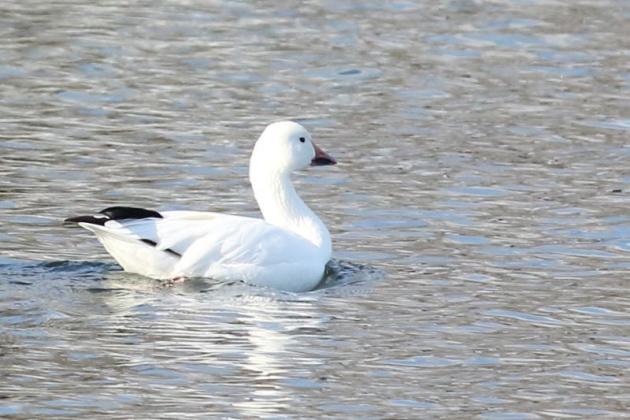Avian Influenza detected in Henderson County waterfowl
Take precautions to protect domestic fowl
---
The presence of highly pathogenic avian influenza (HPAI) has been confirmed in samples taken from two snow geese at Sloughs Wildlife Management Area (WMA) in Henderson County. The Southeastern Cooperative Wildlife Disease Study Virology Laboratory confirmed HPAI in the geese after they were found dead on Dec. 18, 2023.
“HPAI is highly infectious and often deadly in wild and domestic birds,” said Dr. Christine Casey, Kentucky Department of Fish and Wildlife Resources veterinarian. “Practicing good biosecurity and limiting contact between wild birds and domestic flocks is crucial to preventing the spread of the disease.”
Infected birds spread the virus through their saliva, mucus and feces. Symptoms of HPAI in infected birds include incoordination, droopy wings, lethargy, unwillingness to fly, swimming in circles and head tremors.
Waterfowl hunters or people hiking through waterfowl habitat (wetlands, ponds, lakes and streams) are encouraged to take precautions by wearing gloves, changing shoes and disinfecting exposed tools or materials before coming into contact with poultry flocks or other domestic birds at home.
According to the U.S. Centers for Disease Control and Prevention (CDC), the risk to human health posed by HPAI continues to be low. Meat or eggs harvested from wild or domestic birds does not present a food safety risk when handled or cooked properly.
With waterfowl season still open, hunters are urged to follow routine precautions when handling wild game:
--Do not harvest, handle or consume wild birds that are obviously sick or otherwise found dead.
--Dress harvested waterfowl outside or in a well-ventilated area.
--Wear gloves and wash hands with soap and warm water after handling wild birds and disposing of carcasses. If soap and water are not available, use an alcohol-based hand sanitizer.
--Disinfect any equipment (knives and surfaces) that touch birds. Use dedicated tools for cleaning game and avoid using them around poultry or pet birds.
--Do not eat, drink or smoke when handling or cleaning game birds.
--Double bag the feathers and other remains. Tie the inner bag, take off your gloves and leave them in the outer bag before tying it closed. Place the bag in the trash and close the lid on the receptacle. Discard in a trash can with a secure lid to prevent scavengers from getting the carcass.
--All game should be thoroughly cooked to an internal temperature of 165 degrees.
--Do not feed dogs raw or undercooked meat from harvested waterfowl.
Kentucky Fish and Wildlife asks hunters and the public to help with the department’s HPAI surveillance efforts by reporting sick or dead waterfowl, raptors including hawks and eagles, vultures, or groups of dead birds (five or more) by reporting observations via the online HPAI Survey portal or by calling the agency’s Information Center at 1-800-858-1549, 8 a.m. – 4:30 p.m. (ET) weekdays, excluding holidays.
More information about HPAI and wild birds is available on Kentucky Fish and Wildlife’s website at fw.ky.gov under Avian Influenza.



























